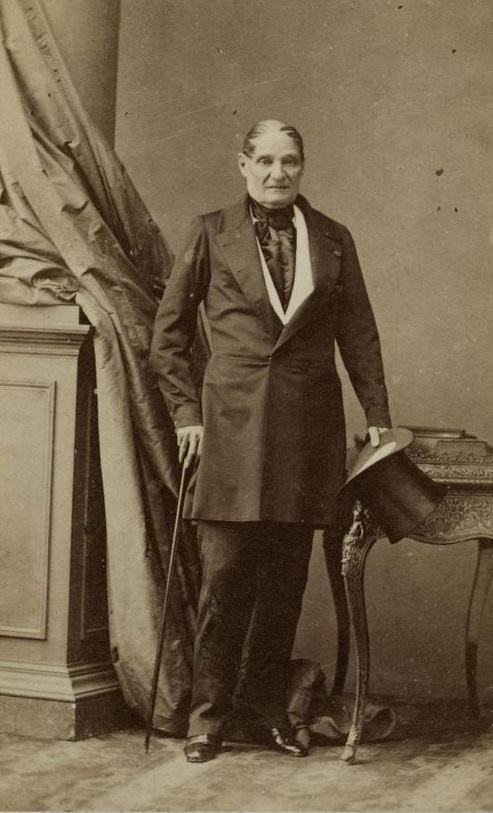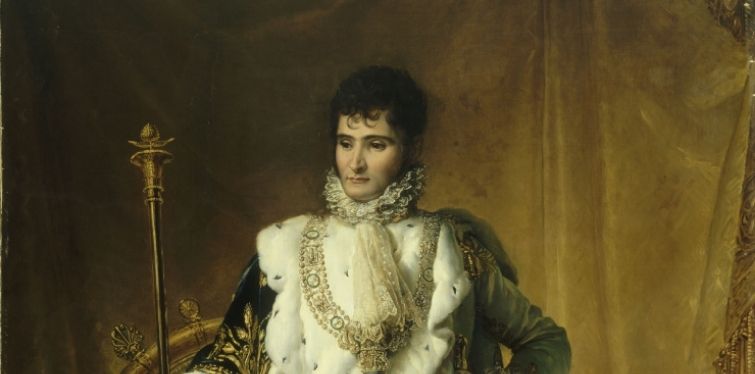We end our blog series on Napoleon’s brothers with Jerome, the youngest of the Bonaparte siblings who ruled as King of Westphalia and fought at Waterloo. Jerome was the only Bonaparte brother to be photographed, and the only one to see his nephew Louis-Napoleon restore the empire as Napoleon III.
Jerome (Girolamo) Bonaparte was born in Ajaccio on 15 November 1784. His father Carlo died only a few months later, leaving the baby in the care of his mother Letizia. Owing to these circumstances Jerome had a varied upbringing and it was only in late 1795, thanks to financial support from his brother Napoleon, that eleven year old Jerome went to school in Paris. In 1799 he finished his studies and moved in with Napoleon and Josephine at Malmaison.
After Napoleon took power as First Consul, the teenager hoped to join his brother on campaign in Italy but was considered too young. When the victorious First Consul returned to Paris, Jerome continued to complain that he was not allowed to join the campaign. To make his peace with his youngest brother, Napoleon gave Jerome the sword he wore at Marengo and made him a second lieutenant of the Chasseurs à cheval. Almost as soon as he had joined the regiment, he fought a duel with a fellow officer and was wounded in the chest.
Not long after this, Napoleon decided that Jerome should embark on a naval career. Perhaps this was motivated by the First Consul’s interest in an invasion of Britain. In any case, Jerome was entrusted to Admiral Ganteaume, one of the French navy’s more talented officers. During an eight month stint in the Mediterranean on board the Indivisible on an abortive mission to supply the French Army in Egypt, Jerome was present for the capture of the British ship HMS Swiftsure on 24 June 1801 and was dispatched by the admiral to accept its surrender.
Following this rare but insignificant French naval success, Jerome was ordered back to Paris by Napoleon and arrived at the beginning of September. With less than a year’s experience at sea, the teenager presented himself as an expert on naval affairs – which initially amused and later annoyed his brother, who decided it was time for him to set sail again. In November he joined Admiral Tréville’s squadron at Rochefort which duly made its way to the West Indies to support operations against Toussaint L’Overture’s Haitians. After a few weeks he became tired of the place and sailed back to France carrying the dispatches from his brother in law General Leclerc, commander-in-chief of the Haitian expedition. Napoleon was not best pleased and sent his brother back to the West Indies as second-in-command of the corvette Epervier. Peace had been made with Britain in March 1802 and the Atlantic was safe for Jerome to sail to Martinique.
After taking command of the Epervier when his friend Captain Halgan fell ill, the newly-minted Lieutenant Bonaparte spent the early months of 1803 sailing around the Caribbean on what was effectively a holiday. When rumours reached Admiral Villeneuve in Martinique that France might soon be at war with Britain, the admiral advised Jerome to return to France immediately. Jerome had other ideas and hoped to visit the United States before returning to Paris. By the end of May Jerome received word from Napoleon to return to Paris right away – in fact, war had already broken out though the news did not yet reach the West Indies.
Defying both his brother and all the senior naval officers, Jerome ordered Epervier back to France (the ship was duly captured en route by the Royal Navy) and took an American boat to Norfolk, Virginia. After paying an unexpected visit to the French ambassador in Washington, Jerome became acquainted with ‘Commodore’ Joshua Barney and stayed at his Baltimore Hotel, all the while resisting the ambassador’s efforts to persuade him to return to France. At Baltimore Jerome befriended the merchant William Patterson and was soon engaged to his daughter Elisabeth. Although Jerome was too young to have his marriage recognised in French law without parental consent, the couple were married on Christmas Eve 1803 with the Archbishop of Baltimore presiding over the ceremony. The young couple became the central fixture of Baltimore society, and Jerome suggested to his American friends that he might be appointed ambassador.
When news of the marriage reached Paris, Napoleon was furious. He had imperial ambitions and he determined that his youngest brother should marry a princess. The First Consul ordered Jerome to return to France at once, while banning ‘Miss Patterson’ from entering France. After several abortive attempts, Jerome and Elisabeth managed to cross the Atlantic and arrived in Lisbon in April 1805. Napoleon ordered Jerome to proceed immediately to Milan, where he was to be crowned King of Italy. After an initial show of resistance, Jerome agreed to make the journey. Meanwhile Elisabeth – in her sixth month of pregnancy – attempted to sail to Amsterdam to await news, but the Dutch authorities refused to admit her and she diverted to London. There she received word that Jerome had submitted to Napoleon’s demands and agreed to divorce Elisabeth. A further confidential letter from Jerome promised that although she would have to return to the United States, he remained committed to her and would prevail on his brother to change his mind in due course. On 7 July Elisabeth had given birth to a son named Jerome Napoleon Bonaparte. Despite messages to Elisabeth expressing a desire to rejoin her and see his son, the matter was no longer up for discussion. Unlike brother Lucien, Jerome was not inclined to give up the prestige of an imperial prince to stay with his wife.

Elizabeth Patterson Bonaparte, triple portrait
Jerome continued to participate in naval missions, sailing from Genoa to Algiers to ostensibly liberate French and Italian prisoners who had in fact been secretly ransomed. In 1805 he was promoted to captain and commanded a ship of the line in efforts to disrupt British commerce in the Atlantic. In August 1806 Jerome returned to France having captured a convoy of British ships. At the time Napoleon was planning his Prussian campaign and informed Jerome of his plans to marry him to Princess Catherine of Württemberg. Jerome assented and a marriage treaty signed on 9 September. Ten days later he was promoted to Rear Admiral. On 8 October Rear Admiral Bonaparte was given command of IX Corps of the Grande Armée, made up of two Bavarian and one Württemberg division. However, the force was not yet ready and Jerome remained in the rear. By the time it was ready the Prussian Army had been comprehensively defeated at Jena and Auerstedt on 14 October.
Nevertheless, there was still work to do as the Prussians continued the fight. Jerome’s Corps of 25,000 men was given the task of conquering the province of Silesia, held only by Prussian garrisons. It soon became clear that Jerome was not up to the task of besieging any fortresses. A series of tactical mistakes prompted Napoleon to send General Dominique Vandamme to take charge of the siege of Glogau, which was duly taken on 2 December. Jerome then marched on Breslau before joining Napoleon at his headquarters, quickly returning in January to sign the capitulation of the Prussian garrison and riding through the streets in triumph. Jerome was taken by the delights of the Silesian capital and spent much of his time in the city’s palace, leaving only to receive the surrenders of garrisons taken by his subordinates. Napoleon, keen to keep up appearances, promoted him to General of Division on 7 March 1807. At his imperial brother’s urging, Jerome became a little more active in the reduction of the final Prussian fortresses by May.
In July the Peace of Tilsit was signed between Napoleon, Tsar Alexander I of Russia, and King Frederick William III of Prussia. As part of the terms Jerome was recognised as King of Westphalia in western Germany. In mid-August he returned to Paris to meet his wife Catherine, to whom he had been married by proxy on the 12th. The couple stayed in the French capital for three months before leaving for Kassel, the capital of their new Kingdom. As with the other kingdoms Napoleon entrusted to his siblings, the Emperor had given Westphalia a constitution and the Napoleonic Law Code, and institutions of state were to copy the French model. True to his being, Jerome was far more interested in elevating the grandeur of his royal court than in matters of state administration. He continued to run up substantial debts, which he would then beg Napoleon to repay for him.

King Jerome and Queen Catherine of Westphalia
1809 was an anxious year for Jerome. The Austrians had declared war on Napoleon in the spring and Jerome was given command of a reserve Corps made up of French, German and Dutch troops. Austria’s defiance triggered a series of insurrections in the name of German unity against French occupation. In June the Duke of Brunswick appeared in Saxony and took Dresden, prompting fears that he might invade Westphalia in conjunction with a column under Austrian General Kienmayer. Jerome gathered up all the men he could get hold off and marched into Saxony to reinforce General Junot, but news of disturbances in his kingdom compelled him to withdraw, condemning Junot to defeat. By this point Napoleon had just defeated the Austrians at Wagram and expected Jerome to follow on and secure Bohemia. He was furious when he received intelligence of Jerome’s retrograde movement and threatened to dismiss him from the command. In the event he left him in nominal command of his corps but only allowed him to keep his Westphalians, sending the rest to Junot in case of a resumption of hostilities, which was averted by the conclusion of peace with Austria in October.
In the aftermath of his victorious 1809 campaign Napoleon continued to reorganise Germany, and added Hanover to Jerome’s Kingdom of Westphalia. No sooner had he done so, having already forced brother Louis from the Dutch throne and annexed his Kingdom of Holland, Napoleon instructed Jerome to cede his territories west of the Rhine. As was his custom, Jerome capitulated to Napoleon’s demands and was happy enough to continue hosting balls and banquets in Kassel, continuing to grow his mountain of debt in the process. Westphalia’s financial woes were exacerbated by the need to maintain not only the Westphalian army, but troops under the command of Marshal Davout, who was responsible for keeping order in central Germany.
In spite of his mediocre military record, Napoleon continued to have high hopes for his youngest brother. Jerome’s big opportunity came in 1812, when Napoleon launched his fateful invasion of Russia. As well as his VIII Corps of Germans, Jerome was to take command of the left wing of the Grande Armée, 100,000 men in total. With this force, Jerome was expected to prevent the 45,000 men of Prince Bagration’s isolated Second Army from retreating into join the Russian First Western Army. As Jerome advanced through modern day Belarus during the end of June, he rejoiced in easy victories capturing lightly defended fortresses, but moved in a leisurely pace, allowing the Russian general to escape. Jerome’s failure to keep up with Bagration prompted Napoleon to order Marshal Davout to join up with Jerome with secret instructions to supersede him if necessary. At the same time, the Emperor criticised his brother for bringing all his royal trappings with him on campaign rather than taking the field as an austere general.

King Jerome on Horseback
Following this rebuke, Jerome began to entertain serious thoughts of resigning his command and returning to his kingdom, writing to his wife to this effect. The final straw came on 14 July, a few days after Jerome occupied the stronghold of Mir, when Davout informed him that he was taking command of the right wing. Jerome duly wrote to Marshals Davout and Berthier (Napoleon’s Chief-of-Staff) that he was resigning his command with immediate effect and taking 6,000 men of the Westphalian Guard with him. Both Napoleon and Davout remonstrated with him to reconsider, but Jerome continued back to Kassel. In the autumn and winter of 1812, while the Grande Armée was being destroyed by heat, disease, hunger, cold as well as the activities of Russian regulars and Cossacks, Jerome continued giving the lavish balls and banquets that he was well known for.
Napoleon’s disaster in 1812 would also deal a mortal blow to Jerome’s Kingdom of Westphalia. The myth of Napoleon’s invincibility had been well and truly shattered, and Napoleon’s German allies began to consider overthrowing the French imperial yoke. In February 1813 Prussia joined Russia in the Sixth Coalition. An advanced column of Cossacks and light cavalry under General Aleksandr Chernyshev penetrated deep into enemy lines and was approaching Kassel by March. Jerome had managed to get together 20,000 men, but these raw recruits began to desert as quickly as they had joined. Jerome’s capital was only saved by the arrival of French reinforcements which forced the Russian general to withdraw.
This merely delayed the inevitable. Despite gaining victory over the Russians and Prussians at Lutzen and Bautzen in May, Napoleon’s fortunes declined following Austria’s entry into the Sixth Coalition in the summer of 1813. Napoleon was desperate for reinforcements from Westphalia, leaving Kassel lightly defended. In late September Jerome evacuated his capital, which was duly taken by Chernyshev. The Russian general proclaimed the dissolution of the Kingdom, but quickly withdrew upon news that a French division was on its way to recapture the city. Jerome returned to Kassel on 17 October. As he was doing so, the fate of Europe was being decided in Leipzig, as the allied armies slowly converged on Napoleon’s positions on the outskirts of the city. On the 18th, several thousand Saxon and Württemberg troops deserted to the allies and on the following day Napoleon ordered his army to withdraw. Following the defeat at Leipzig, both Napoleon and Jerome understood that Germany could no longer be held. On the morning of 26 October, Jerome once evacuated Kassel for good. His subjects eagerly awaited the arrival of the allied liberators.
Jerome returned to France, and in March 1814 joined his brother Joseph in the desperate and vain defence of Paris. Following the collapse of the empire, Jerome and his wife Catherine were refugees. Catherine’s father, the King of Württemberg, refused to allow her to live in Stuttgart with her husband. Eventually the couple went to Graz and then Trieste, where in August Catherine gave birth to a son named Jerome Napoleon, the namesake of his American half-brother. Jerome lived in hope that Tsar Alexander – Catherine’s cousin – might live up to his promise of granting him a kingdom to compensate him for the loss of Westphalia.
In early 1815, the European political stage was once again in upheaval as Napoleon escaped from exile and returned to power in Paris. Jerome arrived in Paris on 27 May and asked for an army command. Napoleon gave him the 6th Division in General Reille’s II Corps. The II Corps and the Count d’Erlon’s I Corps formed the left column under the command of Marshal Ney. On 16 June, Ney advanced on the crossroads at Quatre Bras and began to seriously engage the enemy at noon. As Jerome led his division against the Bossu woods it was charged by the Duke of Brunswick’s light cavalry. The French squares beat of the attack and Brunswick was mortally wounded in the process. Although Jerome managed to capture most of the woods, reinforcements from the Duke of Wellington’s Anglo-allied army continued to arrive at the field. Ney called off the attack and Wellington regained his ground, though was forced to fall back once he heard news of Blucher’s defeat to Napoleon at Ligny.
Following a difficult day of marching in heavy rain on the 17th, the army arrived on the 18th facing Wellington’s army deployed on the ridge of Mont St Jean, a few miles to the south of Waterloo. It wasn’t until noon that Napoleon was able to concentrate his forces on the field. Jerome’s division was on the extreme left of the French battle line and was to launch a diversionary attack on the farm at Hougoumont. After a fierce struggle with Nassau infantrymen, Jerome took the wood next to the farm but was intent on assaulting the farm buildings without artillery support. To his credit, Jerome was in the thick of his fighting, but he had transformed a diversionary attack into a fully-fledged effort to seize the farm buildings with heavy casualties on both sides. In the process Jerome had thrown away almost his entire division, while French assaults on the rest of the allied line did not see much more success. Wellington had managed to hold his ground long enough for Blucher’s Prussians to reach the field. Together, the British and Prussians advanced against the beleaguered French army and forced them into flight. During the retreat Jerome found the Emperor inside a square of the Old Guard. Seeing Jerome’s arm bandaged and his face covered in powder, Napoleon developed a new found respect for his brother’s military conduct.
It was too late. While Napoleon escaped to Paris, Jerome remained with the army and desperately sought to rally the fleeing men. Marshals Soult and Grouchy had managed to get some 50,000 men together, but the politicians in Paris abandoned Napoleon. Paris could only be saved through negotiation, and the allies had made it clear they would not negotiate with Napoleon. Jerome arrived in Paris on 23 June, a day after Napoleon’s second abdication. In the presence of brothers Joseph and Lucien, Napoleon praised Jerome’s actions on campaign and his efforts reorganising the army after Waterloo. But once again the Bonaparte brothers had to plan for life after Napoleon. Jerome sought to once again to go to Württemberg, arriving in August to join his wife Catherine, who had been effectively a prisoner at one of her father’s castles. Only by 1817 did the King of Württemberg decide that he would restore the liberty of his daughter and son-in-law provided they lived on Austrian territory, and the couple returned to Trieste.
In 1820 Catherine gave birth to a daughter, Princess Mathilde Bonaparte. In 1822 a second son followed named Napoleon, who would come to bear a strong resemblance to his uncle and namesake. Not long after, the family moved to Rome. In 1826, after graduating from Harvard, Jerome Patterson Bonaparte went to Europe and saw his father for the first time in his life. He was received warmly and was impressed by Jerome’s extravagant lifestyle, which he continued to lead despite the downturn in the fortunes of his family. In 1834 Catherine died, and the pension that the couple enjoyed from Russia and Württemberg stopped. In 1840 the heavily indebted Jerome married the Italian noblewoman Giustina Bartolini-Baldelli. The marriage of his daughter Mathilde to the wealthy Russian Count Anatoly Demidov also helped to improve Jerome’s finances.

Photograph of Jerome Bonaparte, c. 1852
Having spent more than thirty years abroad, in 1847 Jerome was allowed to return to his native France. The following year, his nephew Louis-Napoleon was elected President of the Second Republic. Jerome was appointed Governor of the Invalides and in 1850 elevated to the rank of Marshal of France. Two years later, Louis-Napoleon established the Second Empire as Napoleon III. Jerome was once again raised to the dignity of Imperial Prince and was named President of the Senate. He was also heir to the Empire until the birth of Napoleon, Prince Imperial in 1856. The 67 year old Jerome helped to legitimise his nephew’s rule by serving as a link to the glorious age of the first Napoleon. He was with the Emperor at the homecoming of the victorious Army of the East which had defeated Russia in the Crimean War. However, even in his final years he continued his rakish existence and caused many a scandal. In 1853 he accused his wife of infidelity and banished her to Florence. Prince Jerome died on 24 June 1860 at the age of 75 and was buried near his brother at the Invalides in a grand funeral procession. The man who had lived his life in such splendour was given an appropriately splendorous send-off.
If you enjoyed this blog post, take a look at our Jerome Bonaparte mug!




Share and get 15% off!
Simply share this product on one of the following social networks and you will unlock 15% off!